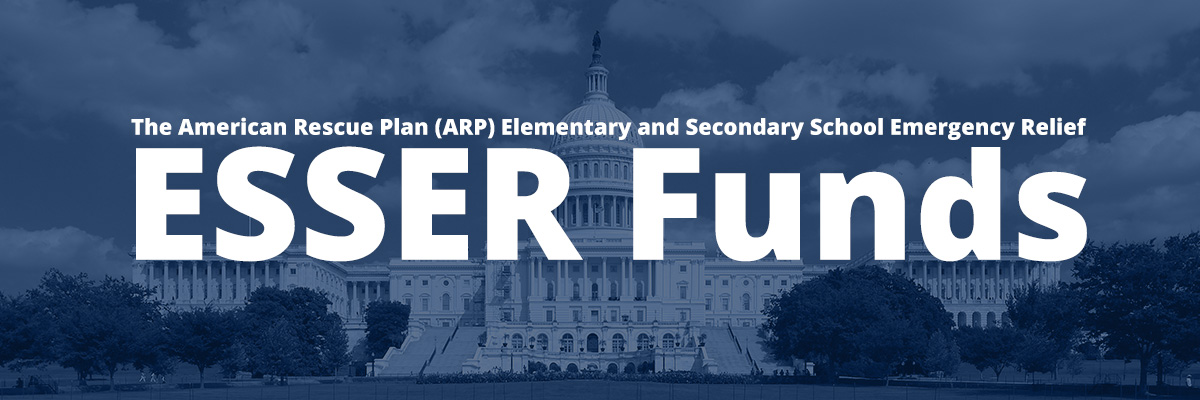American Rescue Plan (ARP) ESSER Funds

What is the American Rescue Plan (ARP)?
On March 11, 2021, the President signed into law the American Rescue Plan Act of 2021 (ARP). ARP makes available $122.8 billion nationally in a third round of Elementary and Secondary School Emergency Relief (ESSER) funds. New York State has been allocated nearly $9 billion under the ARP Act’s Elementary and Secondary School Emergency Relief (ESSER) Fund.
The ARP Act requires LEAs to reserve at least 20% of their ARP-ESSER allocation to address learning loss through the implementation of evidence-based interventions, such as summer learning or summer enrichment, extended day, comprehensive afterschool programs, or extended school year programs, and ensure that such interventions respond to students’ academic, social, and emotional needs.

INFORMATION
The American Rescue Plan (ARP) Elementary and Secondary Emergency Relief Fund (ESSER III) provides $9 Billion to New York State, including over $38 million to Newburgh Schools. Purpose: Congress passed three stimulus bills that provided nearly $190.5 billion to the Elementary and Secondary School Emergency Relief (ESSER) Fund to help safely reopen and sustain the operation of schools in the current academic year and beyond to address the impact of the COVID-19 pandemic on New York’s students by addressing students’ academic, social, emotional, and mental health needs.
PRESENTATIONS
American Rescue Plan (ARP) - July 2024
CRRSA & ARP Plan - June 2023
CRRSA & ARP Plan - Dec. 13, 2022
Leveraging Federal Stimulus Funds - Feb 2022
CRSSA and ARP Presentation - Sept 28, 2021
ESSER III Board Presentation July 1, 2021

FEEDBACK
The district launched a comprehensive stakeholder engagement process to help determine how it should potentially spend federal and state stimulus dollars to address learning,COVID-19 preparedness and COVID 19 recovery. The District launched a web based survey in the spring of 2020 and again in the fall of 2021 that solicited feedback on the district's current progress and needs from parents, students and community members. The Superintendent and his cabinet reported on the survey results to the Board of Education. Various teams were then assembled to collect deeper information on the areas of need identified in the survey process and in response to the question of "How should Newburgh utilize ESSER funds to define innovative practices, redesign systems and learn from others?" Through planning sessions the teams brainstormed proposed ideas, actions and initiatives to implement aligned to the district Strategic Plan Imagine 2025. The assembled teams of diverse stakeholders discussed, assessed and made recommendations aligned with allowed ARP spending.
Surveys
2024 ARP-ESSER Survey
Previous Survey Response Analytics
BUDGETS
- Any activity authorized by the ESEA, including the Native Hawaiian Education Act and the Alaska Native Educational Equity, Support, and Assistance Act (20 U.S.C. 6301 et seq.).
- Any activity authorized by the Individuals with Disabilities Education Act (IDEA) (20 U.S.C. 1400 et seq.).
- Any activity authorized by the Adult Education and Family Literacy Act (AEFLA) (29 U.S.C. 3271 et seq.).
- Any activity authorized by the Carl D. Perkins Career and Technical Education Act of 2006 (Perkins V) (20 U.S.C. 2301 et seq.).
- Any activity authorized by subtitle B of title VII of the McKinney-Vento Homeless Assistance Act (McKinney-Vento) (42 U.S.C. 11431 et seq.).
- Coordinating preparedness and response efforts of LEAs with State, local, Tribal, and territorial public health departments, and other relevant agencies, to improve coordinated responses among such entities to prevent, prepare for, and respond to COVID-19.
- Providing principals and other school leaders with the resources necessary to address the needs of their individual schools.
- Activities to address the unique needs of low-income children or students, students with disabilities, English learners, racial and ethnic minorities, students experiencing homelessness, and children and youth in foster care, including how outreach and service delivery will meet the needs of each population.
- Developing and implementing procedures and systems to improve the preparedness and response efforts of LEAs.
- Training and professional development for staff of the LEA on sanitation and minimizing the spread of infectious diseases.
- Purchasing supplies to sanitize and clean the facilities of the LEA, including buildings operated by such LEA.
- Planning for, coordinating, and implementing activities during long-term closures, including providing meals to eligible students, providing technology for online learning to all students, providing guidance for carrying out requirements under the IDEA and ensuring other education services can continue to be provided consistent with all Federal, State, and local requirements.
- Purchasing educational technology (including hardware, software, and connectivity) for students who are served by the LEA that aids in regular and substantive educational interaction between students and their classroom instructors, including low-income students and students with disabilities, which may include assistive technology or adaptive equipment.
- Providing mental health services and supports, including through the implementation of evidence based full-service community schools.
- Planning and implementing activities related to summer learning and enrichment and supplemental after-school programs, including providing classroom instruction or online learning during the summer months and addressing the needs of low-income students, students with disabilities, English learners, migrant students, students experiencing homelessness, and children and youth in foster care.
- Addressing the academic impact of lost instructional time among an LEA's students (including low-income students, students with disabilities, English learners, racial and ethnic minorities, students experiencing homelessness, and children and youth in foster care) by: a) Administering and using high-quality assessments that are valid and reliable to accurately assess students' academic progress and assist educators in meeting students' academic needs, including through differentiating instruction; b) Implementing evidence-based activities to meet the comprehensive needs of students; c) Providing information and assistance to parents and families on how they can effectively support students, including in a distance learning environment; and d) Tracking student attendance and improving student engagement in distance education.
- School facility repairs and improvements to enable operation of schools to reduce risk of virus transmission and exposure to environmental health hazards, and to support student health needs.
- Inspection, testing, maintenance, repair, replacement, and upgrade projects to improve the indoor air quality in school facilities, including mechanical and non-mechanical heating, ventilation, and air conditioning systems, filtering, purification and other air cleaning, fans, control systems, and window and door repair and replacement.
- Developing strategies and implementing public health protocols including, to the greatest extent practicable, policies in line with guidance from the CDC for the reopening and operation of school facilities to effectively maintain the health and safety of students, educators, and other staff.
- Other activities that are necessary to maintain the operation of and continuity of services in the LEA and continuing to employ existing staff of the LEA.
- 5% Addressing the Impact of Lost Instructional Time.
- 1% Comprehensive After School
- 1% Summer Learning and Enrichment:



